|
|
 Fiera
Properties Bluenose Classic 2014 Fiera
Properties Bluenose Classic 2014
27-Oct to 01-Nov, Nova Scotia, $50k |
|
01-Nov, FINAL:
[2] Peter Barker 3-0 [4] Miguel Rodriguez 11/6,11/7,11/8
(62m)

 In
this evening’s final, Peter Barker demonstrated precision and his
clinical approach to the match served him well. Miguel Rodriguez put
up a strong fight, demonstrating fantastic retrieving and quickness,
and even when he was down two games, it appeared that the momentum
could easily swing in Rodriguez’s favour. In
this evening’s final, Peter Barker demonstrated precision and his
clinical approach to the match served him well. Miguel Rodriguez put
up a strong fight, demonstrating fantastic retrieving and quickness,
and even when he was down two games, it appeared that the momentum
could easily swing in Rodriguez’s favour.
In the end, Barker was able to finish the match in three games and
was crowned 2014 Fiera Properties Bluenose Squash Classic Champion.
Blair Cook describes the match in detail below.
Thanks to Jim Neale for the photographs.
|
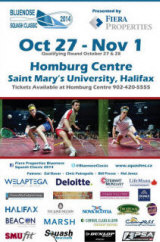
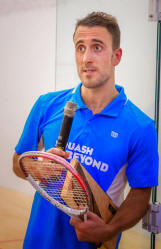
Photos by Jim Neale
and Farley MacLeod
|
  Bluenose
Classic 2014 Bluenose
Classic 2014
27-Oct to 01-Nov, Nova Scotia, $50k |
Round One
29-Oct |
Quarters
30-Oct |
Semis
31 Oct |
Final
01-Oct |
[1] Borja Golan (Esp)
11/2, 11/9, 11/7 ( (45m)
Mohamed Abouelghar (Egy) |
[1] Borja Golan
12/14, 11/7, 11/8, 11/2 (69m)
Tom Richards |
[1] Borja Golan
11/4, 12/10, 13/11
[4] Miguel Rodriguez |
[4] Miguel Rodriguez
11/6, 11/7, 11/8 (62m)
[2] Peter Barker |
[7] Adrian Waller (Eng)
11/9, 11/8, 11/9 (49m)
Tom Richards (Eng) |
[6] Steve Coppinger (Rsa)
11/6, 11/13, 11/9, 11/5 (67m)
[Q] Ryan Cuskelly (Aus) |
[6] Steve Coppinger
5/11, 11/4, 11/8, 7/11, 11/5 (74m)
[4] Miguel Rodriguez |
[4] Miguel Rodriguez (Col)
13/11, 11/8, 12/10 (52m)
Alan Clyne (Sco) |
[Q] Chris Gordon (Usa)
11/6, 11/7, 11/9 (40m)
[3] Daryl Selby (Eng) |
[3] Daryl Selby
13/11, 6/11, 11/7, 8/11, 11/5 (102m)
[8] Alister Walker |
[3] Daryl Selby
11/4, 11/4, 11/6 (40m)
[2] Peter Barker |
[wc] Andrew Schnell (Can)
12/10, 11/6, 11/7 (34m)
[8] Alister Walker (Bot) |
[Q] Diego Elias (Per)
11/9, 11/4, 11/5 (42m)
[5] Cameron Pilley (Aus) |
[5] Cameron Pilley
11/6, 11/7, 9/11, 11/9 (66m)
[2] Peter Barker |
[Q] Sebastiaan Weenink (Ned)
11/4, 11/6, 11/8 (42m)
[2] Peter Barker (Eng) |
28-Oct, Qualifying Finals:
Ryan Cuskelly (Aus) 3-0
Shawn Delierre (Can)
11-8, 11-5, 11-5 (50m)
Sebastiaan Weenink (Ned) 3-1
Muhd Asyraf Azan (Mas) 11-6, 11-9, 7-11, 11-6 (58m)
Diego Elias (Per) 3-2 Cesar Salazar (Mex)
8-11, 3-11, 11-5, 11-7, 11-9 (80m)
Chris Gordon (Usa) 3-1 Shahier Razik (Can)
11-9, 6-11, 11-9, 11-6 (62m)
27-Oct, Qualifying Round One:
Ryan Cuskelly (Aus) bye
Shawn Delierre (Can) 3-0 Mike Buchanan (Can)
11-8, 11-8, 11-3
(25m)
Muhd Asyraf Azan (Mas) 3-0 Matt Bishop (Can)
11-5, 11-6, 11-8 (24m)
Sebastiaan Weenink (Ned) 3-0
Alfredo Avila (Mex)
11-4, 11-5, 11-4 (39m)
Cesar Salazar (Mex) 3-1 Mike McCue (Can)
11-7, 8-11, 11-5, 11-8 (46m)
Diego Elias (Per) 3-0 Josh Rudolph (Can)
11-2, 11-4, 11-4 (21m)
Chris Gordon (Usa) 3-0 Graham Kerford (Can)
11-4, 11-6, 11-5 (20m)
Shahier Razik (Can)
3-0 Martin Knight (Nzl)
11-7, 11-5, 11-8 (54m)
|

The FINAL
And on the 6th day, let the two best players of the week
face each other for one last match to determine who would be
this year’s Fiera Properties Bluenose Squash Classic
champion.
 The
first player to earn their way into the championship court
was none other than the crowd’s favorite acrobat - Miguel
Rodriguez, the returning champion. Rodriquez was coming off
a huge upset last night over the tournament’s number one
seed - Borja Golan. There is just something about the panel
court that appeals to his game and many a player over the
years have been stymied by an inability to put the ball away
against the stealthy Columbian. The
first player to earn their way into the championship court
was none other than the crowd’s favorite acrobat - Miguel
Rodriguez, the returning champion. Rodriquez was coming off
a huge upset last night over the tournament’s number one
seed - Borja Golan. There is just something about the panel
court that appeals to his game and many a player over the
years have been stymied by an inability to put the ball away
against the stealthy Columbian.
The second player earning their way into the night’s final
was Peter Barker of England. He’s no stranger to be in this
court or the finals at this event. In fact, he found himself
in this very position back in 2009 against David Palmer,
only this time he was hoping for a very different outcome.
His play all week has been stellar. Aside from dropping a
game to Cameron Pilley in the Quarter Finals, Barker’s
record has been perfect. He also had a comparatively easier
match last night against Daryl Selby who, rumour had it, was
not playing at 100%.
 At
the outset of the match, the capacity crowd set the odds
pretty evenly. For many of you readers, you are unlikely
familiar with the setup of the Bluenose Squash Classic. Many
professional squash venues utilize the mobile glass court to
set up spectacular venues; however, in Halifax, we do things
a little differently. We set our venue around the small and
intimate venue, which represents the community that is
squash in Nova Scotia. Our venue is at St. Mary’s University
and at capacity, the fire marshal begins cringing when we
start putting more than three digits of people inside the
viewing area. But it’s a crowd of people from all over
Eastern Canada, all of whom know one another, and does it
get loud! At
the outset of the match, the capacity crowd set the odds
pretty evenly. For many of you readers, you are unlikely
familiar with the setup of the Bluenose Squash Classic. Many
professional squash venues utilize the mobile glass court to
set up spectacular venues; however, in Halifax, we do things
a little differently. We set our venue around the small and
intimate venue, which represents the community that is
squash in Nova Scotia. Our venue is at St. Mary’s University
and at capacity, the fire marshal begins cringing when we
start putting more than three digits of people inside the
viewing area. But it’s a crowd of people from all over
Eastern Canada, all of whom know one another, and does it
get loud!
The professional players are treated as adopted members of
this community for the week of the Bluenose Classic each
year with many opting to stay with local families to enjoy
the warm Maritime hospitality. The players get involved in
various dinners, sponsor events, and junior clinics held
throughout the week. Some players, particularly past
champions like Therry Lincou and Laurens Jan Anjema, have
been granted honorary residency status by the squash
community.
As is tradition, the evening of the final starts off with a
fun event. This year was a doubles event between local icons
Matt Bishop and Chris Petropolis versus Cameron Pilley and
newcomer Sebastiaan Weenink (who is quickly becoming another
fan favorite around town). The scores from the match include
Pilley blowing through two sets of strings, Weenink scored
two points lying on his back, and Bishop and Petropolis won
by a landslide, once the age handicaps were factored into
the final tally.
With the seats warm and the refreshments at hand, the match
between Rodriguez and Barker got underway within this
backdrop. The early going of the match had the feel of
something more tactical than physical. Neither player was
pushing the pace, choosing instead to keep the ball deep and
wait for opportunities. In the battle of attrition, Barker
was the early benefactor running up a 6-2 lead as Rodriguez
was trying unsuccessfully to hit those perfect nicks that
had earned him his championship the prior year. Barker
coughed up a couple of errant miscues letting Rodriguez
narrow the gap to 5-8. But Rodriguez threw in a few of his
own handing the first game to Barker 11-6.
The second game began with much the same feel of the first
game. After the match, Barker later admitted that he was
intentionally “playing boring squash…just trying to pin him
[Rodriguez] to the wall to restrict his options, and
increase my own.” “Boring squash” earned him an 8-4 lead
midway through the second game. One shot that Barker used
with recurring success was a deceptive little cross drop
once he had set up the rally sufficiently to get a ball in
the middle of the court.
The crowd began chanting “Vamos!” trying to rally Rodriguez.
Rodriguez dug in under unrelenting pressure from Barker to
earn two more points to narrow the gap to 6-8. But on the
ensuing serve, Barker hit a perfect cross nick, silencing
the Spanish and eliciting a pro-English cheer (we know a
good shot when we see one). He followed that up with two
more well set up drops that gave Barker the second game
11-7.
 In
the third game, the crowd was really pulling for Rodriguez
to help extend the evening. Rodriguez came out all fired up
and went on the full offensive hitting a drop shot and then
charging the front reading Barker’s drives perfectly to hit
the open winner running up a 5-2 advantage at that point. In
the third game, the crowd was really pulling for Rodriguez
to help extend the evening. Rodriguez came out all fired up
and went on the full offensive hitting a drop shot and then
charging the front reading Barker’s drives perfectly to hit
the open winner running up a 5-2 advantage at that point.
But full credit to Barker, he just stuck to his “boring
squash”, persistently putting the ball down the backhand
line again, again, and again keeping Rodriguez retrieving
from the back corner. Barker began trading two and three
points for one against as he clawed his way back to 6-6.
Rodriguez was throwing everything he had at Barker, but
Barker never flinched. After hitting a beautiful overhead
nick to take a 9-8 lead, Barker was pumping his fist,
finally sensing sustainable momentum. He followed that up
with two more well-executed and setup drops to close the
match with an 11-8 score in the third game.
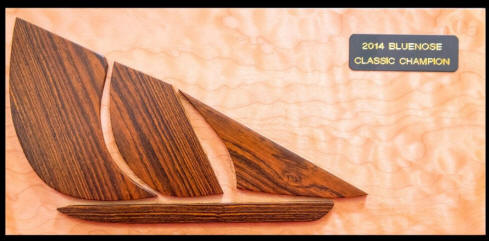
In the post-match interview, Rodriguez confirmed all the
witness accounts of the match, “It was very difficult to
play Peter because he is very precise and accurate. I found
it difficult to read some of his shots.”
Barker’s interview gave a glimpse into how close Rodriguez
had come to breaking the momentum, “Toward the end of the
match I was hanging on a bit. His [Rodriguez] game has come
on since working with David Palmer [interestingly to whom
Barker lost to in 2009]. He’s disciplined and has speed and
I give him full credit for the big win he had yesterday
[over Borja Golan].”
Rob Roy, title sponsor of the event, congratulated Peter
Barker on his victory, “You are one of us now.” Hopefully,
this brings the Englishman back for years to come.
Zal Davar, the founder of this event, spent a few moments to
single out the contribution of all those involved, but in
particular this year to the referees. To pull off an event
of this caliber takes world class referees and Zal and his
comrade in arms Graham Waters of 35 years, are members of a
lonely team of volunteers that wade through “the shades of
gray and the layers of gray” to make split second judgments.
One patron shared, “I don’t quite see the attraction of
being a referee,” which quite aptly sums up the unique
talents and dedication of this group.
Neil Harvey, another anointed member of the Nova Scotia
squash community, began the night by posing a question,
“What life skills can be learned by squash?” The lesson was
brilliantly taught this evening by the likes of Peter Barker
and Miguel Rodriguez - stay in the rallies, even those you
are losing, and often you’ll come out ahead.
With those words spoken, the Bluenose Squash Classic of 2014
was written into the history books. And on the 7th day, may
all the players, volunteers, spectators, and yes, referees,
find rest.
By Blair Cook
|
|
Live Blog Bluenose Squash Classic 2014 |
|
ROUNDUPS:
31-Oct, Semis:
 After
an unseasonably warm, beautiful, sunny day, while many ghosts and
goblins were out collecting treats and performing tricks, the
faithful and determined squash fans of Halifax made their way to the
Homburg Centre at St. Mary’s University see how their favourite
squash players would fare this evening. Such faithful fans have been
known to brave full-blown snowstorms to make it to the Bluenose
(when held in February), so this was really not a challenge at all.
A few of the pros even demonstrated their sporting ways by donning
costumes to entertain the crowd in unexpected ways. After
an unseasonably warm, beautiful, sunny day, while many ghosts and
goblins were out collecting treats and performing tricks, the
faithful and determined squash fans of Halifax made their way to the
Homburg Centre at St. Mary’s University see how their favourite
squash players would fare this evening. Such faithful fans have been
known to brave full-blown snowstorms to make it to the Bluenose
(when held in February), so this was really not a challenge at all.
A few of the pros even demonstrated their sporting ways by donning
costumes to entertain the crowd in unexpected ways.
On the court, it was somewhat of a contrast to last evening.
Tonight, both matches were over after three games, whereas this
didn’t happen in any of the four matches last night. These things
are likely correlated however, as it was clear that Selby didn’t
survive the match the night before with Alister Walker unscathed. In
fact, in his post game interview, Selby acknowledged “a few
problems” physically other than simply being fatigued, but also
credited Barker for keeping him under pressure at the back of the
court, noting, “Pete was too strong”. Selby also credited Walker’s
efforts the night before, and noted he was “delighted to come
through that” and “today was a bit of a bonus”.
 After
all was said and done, the crowd was left with great anticipation
for a battle royal tomorrow. Rodriguez and Barker met at the
Bluenose in 2009, with that contest going to Barker, who has never
lost to Rodriguez on the PSA Tour. However, Rodriguez will be
defending his 2013 title, and with his frequent smile and endless
energy on the court, he has made many fans in Halifax, and will most
likely have the crowd on his side. After
all was said and done, the crowd was left with great anticipation
for a battle royal tomorrow. Rodriguez and Barker met at the
Bluenose in 2009, with that contest going to Barker, who has never
lost to Rodriguez on the PSA Tour. However, Rodriguez will be
defending his 2013 title, and with his frequent smile and endless
energy on the court, he has made many fans in Halifax, and will most
likely have the crowd on his side.
Although SquashTV isn’t covering this event, we are providing
play-by-play analysis via Cover It Live. I would contend that our
Cover It Live team of Patrick Kelly, Jill Moore, and David Westwood
could match wits with Joey Barrignton and Paul Johnson any day of
the week. We may not have video review, but they will share their
opinions on the lets and strokes (and you will never have video
evidence to prove them wrong). So if you are not able to make it to
Halifax, follow us on Cover It Live through the link on SquashSite.
You can even add your two cents in the commentary.
30-Oct, Quarters:
The fans at St. Mary’s University in Halifax, Nova Scotia may have
been wondering if Halloween had come early tonight, as they
certainly were given a treat. The level of competition rose up
again. There were certainly also some tricks to be seen, as players
showed their deceptiveness, speed, and deft racquet skills to fool
their opponents.
The shortest match of the night was over an hour in duration, with
all matches being hard-fought battles for a spot in the semifinals.
None of the challengers were able to upset the top four seeds, who
all move on as predicted by their seedings.
29 Oct, Round One:
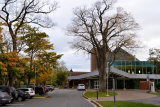 Halifax
squash fans have already been treated to some impressive squash
through the qualifying rounds of the 2014 Fiera Properties Bluenose
Squash Classic. Halifax
squash fans have already been treated to some impressive squash
through the qualifying rounds of the 2014 Fiera Properties Bluenose
Squash Classic.
One of the most fascinating aspects of watching a squash tournament
from start to finish is the ascending level of play that occurs
through the week, and seeing players who amazed us with spectacular
play one night, lose the next night to an even more skilled player
the next night. In fact, that is just what we saw tonight, as none
of our qualifiers were able to secure a victory in the main round.
There were no blowout victories tonight, but no marathons either.
Tom Richards of England pulled off the only upset of the night
against his compatriot Adrian Waller. However, this isn’t as much of
an upset as the rankings would suggest, given Richards’ PSA tour
experience and previous world number 12 ranking.
Following the matches, our tournament MC Neil Harvey took the
opportunity to single out the skill and prospective talent of
youngster Diego Elias of Peru, despite his loss to Cameron Pilley.
Harvey stated he had “not seen such a young, intelligent squash
brain since Jansher Khan”. I don’t think there is a greater
complement to be paid, and we very much look forward to seeing the
talents of the young Peruvian grow at future Bluenose events.
=
27-Oct, Qualifying Finals:
 Halifax
squash fans were treated to a full night of high quality squash on
the second day of qualifying for the 2014 Fiera Properties Bluenose
Squash Classic. Halifax
squash fans were treated to a full night of high quality squash on
the second day of qualifying for the 2014 Fiera Properties Bluenose
Squash Classic.
There were no short matches tonight, as the competitors were all
closely matched. Ryan Cuskelly, the top-ranked qualifier,
took his predicted place in the main round with a win over former
Bluenose champion Shawn Delierre. However, Cuskelly was the only one
of the highest five ranked qualifiers to make it through to the main
draw. Sebastiaan Weenink scored his second upset victory in
as many nights.
 It
is quite likely that we had a glimpse of part of the future of PSA
squash, as the 17-year-old World Junior Champion Diego Elias
of Peru showed maturity beyond his years in a comeback victory over
the higher ranked Cesar Salazaar of Mexico. Elias demonstrated a
range of skills that is downright scary for someone his age. It
is quite likely that we had a glimpse of part of the future of PSA
squash, as the 17-year-old World Junior Champion Diego Elias
of Peru showed maturity beyond his years in a comeback victory over
the higher ranked Cesar Salazaar of Mexico. Elias demonstrated a
range of skills that is downright scary for someone his age.
In the end, our four qualifiers who move on to the main draw on
Wednesday represent four continents, highlighting the high level
international draw that Bluenose fans will get to enjoy over the
next four days.
 27-Oct,
Qualifying Round One: 27-Oct,
Qualifying Round One:
The first round of qualifying
of the 2014 Fiera Properties Bluenose Squash Classic saw an
enthusiastic crowd on hand to watch squash players from near and
far. Some matches saw local hopeful challenge PSA tour
professionals.
|

Draw & Results
Photos by Jim Neale
and Farley MacLeod
|
|
SEMI-FINALS: |
[4] Miguel
Rodriguez (COL) bt [1] Borja Golan (ESP) 11-4, 12-10, 13-11 (66
m)
The crowd was slow to warm up on this All Hallows Eve, despite
the presence of Cameron Pilley dressed as Moses and Sebastian
Weenink dressed in a pink wig and very revealing skirt. Perhaps
the Halifax squash fans were exhausted from the 6 hours of
squash last night in the epic quarterfinal matches. In any
event, energy began to build as Miguel Rodriguez, last year’s
champion and absolute fan favourite, took to the court for the
knock up. A rousing cheer also went up for long-time Bluenose
competitor Borja Golan from Spain, the top seed in the
tournament.
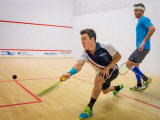 The
first game went by very quickly, and in favour of the Colombian
superstar 11-4. Golan was not hitting the corners with his usual
precision, and he was victimized by several “strokes” despite
his protests to the officials upstairs. Rodriguez, on the other
hand, was incredibly steady, making at most one error in the
opening game. A puzzled hush fell over the crowd between games,
as fans tried to make sense of the lopsided score line. The
first game went by very quickly, and in favour of the Colombian
superstar 11-4. Golan was not hitting the corners with his usual
precision, and he was victimized by several “strokes” despite
his protests to the officials upstairs. Rodriguez, on the other
hand, was incredibly steady, making at most one error in the
opening game. A puzzled hush fell over the crowd between games,
as fans tried to make sense of the lopsided score line.
The second game began much like the first, with Rodriguez
storming to a 4-0 lead before fans had finished the first sip of
their drinks. On the strength of a few more strokes against
Golan it was quickly a deep 3-7 hole for the Spanish number one.
Giving his head a metaphorical shake, Golan began to tighten up
his shots and dialed up some additional power. He was able to
trade points with Rodriguez up to 10-6 in favour of the
Colombian. Then, something began to click for Golan as his feet
began to move more quickly and he began to attack with more vim
and vigor. Before long he had forced a tiebreak, and surely
Rodriguez began to wonder if he had woken the beast. Instead of
crumbling, however, Rodriguez shored up his own performance and
closed out the game 12-10 on the strength of some impressive
drops and deceptive flicks.
Now in a 0-2 hole, things looked rather grim for Golan as he was
confronted with the very real possibility of exiting the
tournament before taking his anticipated place in the finals.
This realization seemed to light a fire under the Spaniard, and
he quickly fired in five points to amass a solid lead for the
first time in the match. However, Rodriguez fought back with
four points of his own to keep Golan within striking distance.
Back and forth with a dizzying array of drops, nicks,
recoveries, lobs, and deceptive cross-court shots, the fans were
treated to a taste of everything. Neither player able to gain a
clear advantage, the score crept again to a tiebreak. This time
it was Golan who earned the first game-ball at 11-10, only to
let the lead slip as Rodriguez gained three points to close out
the third game 13-11 and take the match 3 games to love in 66
minutes.
In the post-match interview with Master of Ceremonies Neil
Harvey, Miguel commented that he drank “a lot of water” today in
an effort to recover from yesterday’s five-game victory over
Steve Coppinger. He went on to praise Golan for his tremendous
skill and power, and noted, “I seem to play better when I face
the top guys”. No doubt pleased to see his way through to a
second consecutive final at the Bluenose Squash Classic, Miguel
vowed to “bring his best game” tomorrow to the applause of the
fans in attendance at the Homburg Centre.
By David Westwood
[2] Peter Barker (ENG) bt [3] Daryl Selby (ENG) 11-4, 11-4,
11-6 (40 mins)
The second semi-final for the evening featured two fellow
countrymen very familiar with each other's games, having known
each other since they were six years of age. Barker came out
focused and determined in the first game, waiting for his
opportunity to kill the ball, to take a quick 4-0 lead. During
the middle portion of the game, Selby tried to get himself back
into the game, but Barker tracked the ball well, using excellent
footwork and shot selection to conserve his energy, going up
7-1, before making two unforced errors for a score of 7-3. Selby
attempted to change the pace of the game, in efforts to shift
Barker's momentum; however, Barker was equal to the task. He
maintained his consistent play and closed out the first game
with a precise drop shot in the front left corner for a final
score of 11-4.
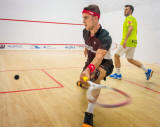 In
the second game, Barker again started off with a 4-1 lead,
capitalizing on loose returns from Selby with unretrievable
shots. At the midpoint, Barker continued to control the play,
demonstrating patience in drawing out the rallies. This appeared
to wear Selby down, given his grueling 5-game match the evening
before, resulting in several mistakes on which Barker could kill
the ball. Selby appeared to get his second wind, increasing the
pressure on Barker, resulting in two unforced errors, but Barker
quickly regrouped with two quick powerful frontcourt nicks,
followed by two perfect drop shots to win the game 11-4. In
the second game, Barker again started off with a 4-1 lead,
capitalizing on loose returns from Selby with unretrievable
shots. At the midpoint, Barker continued to control the play,
demonstrating patience in drawing out the rallies. This appeared
to wear Selby down, given his grueling 5-game match the evening
before, resulting in several mistakes on which Barker could kill
the ball. Selby appeared to get his second wind, increasing the
pressure on Barker, resulting in two unforced errors, but Barker
quickly regrouped with two quick powerful frontcourt nicks,
followed by two perfect drop shots to win the game 11-4.
Barker maintained his focus in the third game, but Selby was up
for the challenge, starting off with a 2-2 tie. Once again,
Barker was hunting the ball well, making kill shots at the
opportune moments, and though Selby made a few theatrical saves
to keep the ball alive, he appeared to fatigue, allowing Barker
to take a 7-3 lead. Selby tried to close the gap, tightening up
his lengths along the wall for a score of 8-6; however, Barker
was focused on the finish line, and continued to force Selby in
the back court, closing out the match by controlling the
business end of the game with three consecutive points,
resulting in an 11-6 score, and taking the match 3-0.
In the post match interview, in response to a question of how he
played knowing that Daryl was tired, Barker acknowledged “a few
factors came into it today… the fact that he has beaten me the
last four times, so I was due one”. He stated “I just had to
play quite disciplined and slow it down, Daryl has such great
hands, and if you give him anything at the front, he can put you
and hold you and do whatever, so I always like to play a typical
English boring squash to the back and just to try to keep him
behind me”. (the crowd laughs) Barker went on to say that he
felt that he has been allowing himself to play in a more relaxed
fashion this week in Halifax, after a short vacation and looking
forward to the World Championships, and is pleased and surprised
by his play so far. He proceeded to complement his upcoming
opponent (Rodriguez) and his recent improvements, noting that he
has his work cut out for him in the finals.
By Brian Reid
|
|
QUARTER-FINALS |
[1] Borja Golan
(ESP) bt Tom Richards (ENG) 12-14, 11-7, 11-8, 11-2 (69m)
The first match of the evening pitted the tournament’s number
one seed Borja Golan against the 22nd world ranked player Tom
Richards of England.
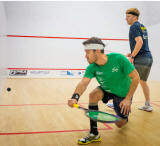 The
first game started a little tentative for both players as they
got a feel for the speed of the ball and the positioning of
their opponent on the court. Golan uncharacteristically had
three errors early, giving the patient Richards a 7-4 advantage
midway through the first game. Richards was finding success just
keeping the ball deep and sustaining the rally long enough for
Golan to make a mistake. But Golan was in no mood to give up a
game and fought his way back, eventually earning a game point at
10-9. Golan had the first game all but sealed when he missed a
free opportunity to drive an errant volley into an open court.
This gave Richards a second life and he capitalized on it a few
points later, taking the first game 14-12. Hmm, this could be
interesting. The
first game started a little tentative for both players as they
got a feel for the speed of the ball and the positioning of
their opponent on the court. Golan uncharacteristically had
three errors early, giving the patient Richards a 7-4 advantage
midway through the first game. Richards was finding success just
keeping the ball deep and sustaining the rally long enough for
Golan to make a mistake. But Golan was in no mood to give up a
game and fought his way back, eventually earning a game point at
10-9. Golan had the first game all but sealed when he missed a
free opportunity to drive an errant volley into an open court.
This gave Richards a second life and he capitalized on it a few
points later, taking the first game 14-12. Hmm, this could be
interesting.
The second game saw Richards jump out to another 3-1 lead. After
a vicious rally of retrievals, Golan was pumping his fist even
though he had only narrowed the gap to 2-3. Something had him
fired up because he clearly took control of the momentum of the
second game from that point forward running up a 7-4 lead. Then
a shocking “no let” call favoring Richards had the crowd buzzing
and Golan couldn’t believe it. Richards added two more counters
to climb back within one. But Golan shut down any idea Richards
had of pulling out another comeback. Golan quickly and
confidently finished off the second game 11-7 from there.
Game three had the feel that Golan was in control, yet Richards
never let him stray too far ahead. With the score 7-5 trending
for Golan, another “no let” call had him wide eyed and arguing
with the refs. But this time, Golan’s focus was laser sharp. In
the ensuing rally, he blasted a drive by Richards who hadn’t
witnessed that much pace on the ball in the match thus far. From
there, it felt like an organized procession to a well-controlled
11-8 victory for Golan to take the third game.
In the fourth game, Golan’s superior seeding was beginning to
shine. He was setting up rallies. He was moving Richards around
to all four corners. He was forcing Richards to go for shots
with lower percentages. Richards’ disciplined game strategy of
just keeping Golan deep in the court and patiently waiting him
out was gone. Golan was now completely controlling the game and
cruised to an 11-2 victory, punching his ticket to the
semi-finals tomorrow night.
By Blair Cook
[4] Miguel Rodriguez (COL) bt [6] Stephen Coppinger (RSA)
5-11, 11-4, 11-8, 7-11, 11-5 (74 min)
The second match of the evening saw an influx of squash fans
pile in to see what was lined up to be one of the closest of the
night on paper.
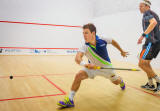 A
furious pace prevailed throughout the match, with the tall South
African directing the flow in the first game with his low quick
straight drives. Looking at only their feet, Rodriguez seemingly
took twice the amount of steps than his opponent did to get to
the same areas of the court – but he certainly makes up for it
by being so incredibly swift! From 5-5 onward Coppinger ran away
with it, making it quite apparent that Rodriguez needed a change
of tactics to take the match to the strong South African. It was
just the opening game, but at an 11-5 margin you could certainly
sense the high potential for Coppinger’s first PSA win over
Rodriguez. A
furious pace prevailed throughout the match, with the tall South
African directing the flow in the first game with his low quick
straight drives. Looking at only their feet, Rodriguez seemingly
took twice the amount of steps than his opponent did to get to
the same areas of the court – but he certainly makes up for it
by being so incredibly swift! From 5-5 onward Coppinger ran away
with it, making it quite apparent that Rodriguez needed a change
of tactics to take the match to the strong South African. It was
just the opening game, but at an 11-5 margin you could certainly
sense the high potential for Coppinger’s first PSA win over
Rodriguez.
Rodriguez got off to the start he wanted in the second, quickly
going up 4-0 from a couple of impressive holds, a stroke
decision and a tin from Coppinger. Now we’re seeing the reigning
Bluenose champ come to form! Much more patient play from the
Columbian at 5-2 up resulted in a second string of points from
tins off the Coppinger racquet. Even with a mammoth 9-2 lead,
Rodriguez continued to use remarkable capoeira-like movements to
chase down that tiny rubber ball. Dropping only one game ball
opportunity, the Columbian Cannonball leveled off the match
taking the second 11-4.
The third was a replica of the previous game, with many early
tins from Coppinger giving Rodriguez an enormous 6-0 lead. With
so much tin from Coppinger, his frustration turned to disbelief,
and an 8-2 lead for Rodriguez. With seven game balls sitting
comfortably at 10-3, a massive momentum shift saw Coppinger
return to the form he started off the match with. With every
game ball saved, the cheers and jeers emanating from the
audience below grew louder and louder. One can imagine a similar
elevation of pressure Rodriguez must have been feeling to close
it out. After five game balls saved, mostly by using
Palmer-coached early volley drops to the opposing corner, it was
the same shot that eventually cost him when one found the middle
of the tin.
It really seemed like Coppinger’s match to win or lose as he
flipped from making Miguel run circles around him by cutting off
every ball, to catching the tin several times giving relatively
easy points to his opponent. The fourth game saw the former
Coppinger, taking a 5-1 lead. A great Bluenose moment midway
through saw Rodriguez lob, Coppinger accidentally drop his
racquet as he moved past Rodriguez, stick out his tongue in
urgency, manage to pick it up and scramble back in the rally and
go on to win the point! The crowd just loved every Coppinger
reaction at this point. He rode this momentum to take the fourth
11-7 and push to a deciding fifth.
It was quite clear that Rodriguez’ tactic was to extend the
rallies as long as possible, rely on his fast legs to retrieve,
and wait for either an opportunity or a tin from his opponent.
He got exactly what he wanted in the second rally, as it went
well over two minutes. Even though he didn’t get the point, it
may have been one of the major factors that caused so many tins
from Coppinger in the latter stage of the match decider. Despite
going up 3-0, Coppinger couldn't retain the form that he needed
to win the match. A couple great taxis from both players brought
the match to level at 5-5, but this is when the Coppinger tin
affinity kicked in. Rodriguez used the opening to get a string
of 6 points in seemingly no time - a slightly uncharacteristic
end to an otherwise highly entertaining match.
By Jeff Scribner
[3] Daryl Selby (ENG) bt [8] Alister Walker (BOT) 13-11,
6-11, 11-7, 8-11, 11-5 (102 mins)
Despite a significant gap between these two in the rankings,
their head-to-head history is 2-2. Both of these players have
played in the Bluenose Classic previously, with Selby being a
three-time runner up.
 The
first game began with the players taking a conservative
approach, with most shots being played in the back of the court.
The pace was fairly gentle and steady. Neither player was able
to carve out a lead, and the score remained close through the
game. They picked up the pace as the game went on, with both
getting somewhat more aggressive. Walker hit some tight drops
throughout the game. Selby closed out the game with a winning
drop and a 13-11 score. The
first game began with the players taking a conservative
approach, with most shots being played in the back of the court.
The pace was fairly gentle and steady. Neither player was able
to carve out a lead, and the score remained close through the
game. They picked up the pace as the game went on, with both
getting somewhat more aggressive. Walker hit some tight drops
throughout the game. Selby closed out the game with a winning
drop and a 13-11 score.
In the second game, Walker brought more winning drops to take a
3-0 lead. At 4-3 for Walker, after three let calls in a row,
they played a ferocious rally, with Walker coming out on the
better end of it. Walker was able to maintain his lead through
the rest of the game, with some assistance from Selby in hitting
tin on a couple of occasions. At game ball, Selby went for the
cross-court winner, but missed, giving Walker a loose ball,
which he dropped nicely into the nick. 11-6 Walker. Games are
tied 1-1.
Selby went out to a 6-2 lead at the start of the third game,
thanks to some good length. He demonstrated tight shots that
Walker wasn’t able to return. At 10-7, Selby hit Walker's
racquet with a shot to the front wall, sending the racquet
flying to the front of the court, with Selby being awarded a
penalty stroke and the game 11-7.
Both players demonstrated excellent retrieving to begin the
fourth game, but Walker tinned two shots to give Selby a 3-1
lead. Selby managed a 5-2 lead with good length and tight shots,
but Walker fought back to tie the game 5-5. This game, as well
as much of the match saw quite a few rallies ending in let
calls, with many being replayed as a result of Yes Let
decisions. The score didn’t wander too far from a tie, until
Walker managed a 10-8 lead, proceeding to hit a perfect drop
shot for the win.
After the fourth game, it appeared as though this was anyone’s
match. Both players were playing great, and not showing negative
effects of the longest match of the evening. The fifth game
started out with the score remaining close until 3-3, but from
that point forward, Selby climbed into a lead and Walker
proceeded to hit three tins in a row to extend Selby’s lead to
9-5. A winning drop by Selby and an error by Walker ended this
match sending Selby further into the draw in a chase for his
elusive first Bluenose Classic title.
By Farley MacLeod
[2] Peter Barker (ENG) bt. [5] Cameron Pilley (AUS) 11-6,
11-7, 9-11, 11-9 (66 mins)
The last quarterfinal of the evening featured second-seed Barker
(WR #8) against the fifth-seed Pilley (WR #22).
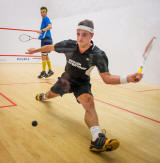 Both
players came out strong, hitting the ball crisply into the back
corners. Pilley played his signature power-shots down the lines,
hitting several winners, but Barker was up to the challenge,
with his consistent play leading to a 4-4 tie. Barker's
excellent shot selection and steady pressure led to an 8-4 lead.
Pilley was able to pull close with a couple of nicks in the
front court and off the service return, but some unforced errors
and a final “stroke” call allowed Barker to close out the first
game 11-6. Both
players came out strong, hitting the ball crisply into the back
corners. Pilley played his signature power-shots down the lines,
hitting several winners, but Barker was up to the challenge,
with his consistent play leading to a 4-4 tie. Barker's
excellent shot selection and steady pressure led to an 8-4 lead.
Pilley was able to pull close with a couple of nicks in the
front court and off the service return, but some unforced errors
and a final “stroke” call allowed Barker to close out the first
game 11-6.
The second game started with Pilley using his power to his
advantage, jumping out to a 4-1 lead; however, Barker began to
control the pace of the game to pull even at 4-4. Barker then
gained the lead with a quick drop, followed by a powerful
frontcourt nick. Pilley appeared to be rattled by a subsequent
“stroke” call, making two unforced errors, before regaining his
composure for a beautiful powerful left front court nick,
mirroring Barker's earlier shot. The players traded points with
nicks being the winning shots of choice, but another “stroke”
call on game ball resulted in an 11-7 victory for Barker.
In the third game, a number of let calls appeared to faze
Barker, allowing Pilley to capitalize on his opportunities,
demonstrating great shot selection with a variety of winning
shots, for a 5-1 lead. Barker seemed to regroup and the players
traded points for a fast and furious few minutes, resulting in a
score of 10-5, with game ball for Pilley. Barker then slowed the
pace of the rallies and was able to save 4 game points,
including a beautiful sequence in which he returned Pilley's
cross-court nick with a stellar drop shot; however, Pilley
replied with a trickle boast to take the third 11-9.
Pilley continued his pattern of quick starts in the fourth,
again jumping out to a 4-0 lead. Both players seemed to shorten
their rallies, attempting winning shots more frequently, and
trading points back and forth to a score of 9-5; however, again,
Barker slowed the tempo of the match, moving Pilley around the
court and changing directionality of the ball, with the game
drawing even at 9-9. Barker continued his momentum with two
great lengths to finish the final game 11-9.
By Brian Reid
|
|
ROUND ONE |
28-Oct, Round One:
more photos
[1] Borja Golan (ESP) bt Mohamed Abouelghar (EGY) 11-2, 11-9,
11-7 (45m)
Golan, the 31-year-old from Spain, is a perennial Bluenose
contender. This is his sixth appearance at the Bluenose Classic,
and while he has not yet been the champion, he has twice been
runner-up. Abouelghar, the 21-year-old from Giza, Egypt was
making his first appearance in Halifax. This was a classic youth
vs. experience matchup. Golan was the heavy favourite going in
to this match, having won the only two previous PSA head-to-head
matches, both played in August of this year in Hong Kong and
Malaysia.
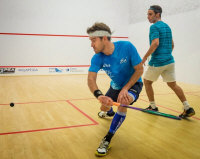 The
first game saw Golan exert dominance over the younger
Abouelghar, with a swift victory for the Spaniard. He was
hitting tight drops and good length and the young Egyptian
didn't have time to orient himself to the pace before the game
was over 11-2. The
first game saw Golan exert dominance over the younger
Abouelghar, with a swift victory for the Spaniard. He was
hitting tight drops and good length and the young Egyptian
didn't have time to orient himself to the pace before the game
was over 11-2.
In the second game, Abouelghar got a better start, going up 4-1.
It is apparent that one of his favorite shots is a cross-court
drop, however, he never seemed to hit the nick he was looking
for, and Golan stormed back to take a 5-4 lead. Abouelghar
brought out a potent smash which earned him two points to tie
the game at 7, before Golan unleashed a smash into the nick to
go up 8-7. They traded points before Golan put Abouelghar under
pressure such that he was forced to play a ball off the back
wall on game ball, and he hit it too high on the front wall,
giving Golan the game with a score of 11-9.
Just like in the second game, Abouelghar took an early 4-1 lead
in the third, with his cross-court nick finally paying
dividends. However, Golan's experience and patience resulted in
him working himself back into the lead at 6-5. Golan's mix of
tight shots, good length, and mostly precise drops allowed him
to keep the Egyptian under pressure and run out to an 11-7
victory in 45 minutes.
In his post match interview, when asked about his game plan,
Golan described Mohamed as “a really young player, but also
really talented”, he said “I know I have to play really serious,
and concentrate, I know he is really dangerous, as he has so
many shots in the front…I just have to keep my length very good
and I just have to be serious every point”.
When asked about returning to Halifax, Golan noted, “It is
really nice to be back…the tournament is great, the people are
great. I always stay with Sandy and Gail…I come and see them
because they always treat me very nice…all the players are happy
to come to this tournament”.
by Farley MacLeod
Tom Richards (ENG) bt [7] Adrian Waller (ENG) 11-9, 11-8,
11-9 (49m)
The first game saw both players coming out fired up, both going
for kill shots. They were volleying, cutting the ball off
whenever possible, and not letting the ball reach the back wall.
At every opportunity they were going for cross-court nicks and
drops. Each player was making winning shots, bringing the score
to 4-4 to start the game. It was Waller that seemed to be the
more aggressive player in the mid portion of the game, but
Richards’ retrieving managed to weather the storm, and he hade
some great shots of his own to take the lead at 9-8.
 During
the business end of the game, it was Richards that turned it
around and became the aggressor, putting Waller in all four
corners, hitting three winning shots in a row to win the game
11-9. During
the business end of the game, it was Richards that turned it
around and became the aggressor, putting Waller in all four
corners, hitting three winning shots in a row to win the game
11-9.
This second game started out the same as the first as both
players came out firing winning drives deep into the back
corners and hitting nicks in the front corners as they started
out 4-4 again. Waller managed to build a small lead to 8-6, but
Richards picked up the pace and started to put pressure back on
Waller, causing him to make several unforced errors to tie the
game back up at 8-8. Richards kept this pace up for the
remaining rallies, winning the next three points with winning
drives into the back corners and finished the game with a fake
drive to the back and hit a gaming-winning boast.
In the third, Richards started off right where he left off in
the second game, being aggressive and keeping the ball in the
back corners, and built a quick 7-2 lead. Both players were
consistent throughout the middle portion of the game but it was
Richards who was up 10-6. That's when Waller picked up the pace
and was putting the pressure on Richards, forcing him to hit
several loose shots that Waller capitalized on and closed the
gap to 9-10. During the final rally, Waller had the pressure on
Richards once again, hitting several drop shots in a row, but
when he tried to cross-court Richards counter drop, Richards
read the play and was ready for the crosscourt, and hit a
winning length down the left sidewall to win the game at 11-9.
By Brian Reid
[7] Steve Coppinger (RSA) bt Ryan Cuskelly (AUS) 11-6, 11-13,
11-9, 11-5 (67m)
Quite contrasting matches kicked off the first round of the 2014
Bluenose Squash Classic. With an Egyptian & Spaniard on Court 3,
and two players from countries in the British Commonwealth on
Court 2, the majority of the crowd chose to watch the only
Egyptian in the draw for the flare potential he might bring. The
start of the Court 2 match played out as one might expect, with
long patient rallies all in the back of the court, but at 5-4
for Coppinger, the players started moving the ball around to all
four corners. It was the tall South African that took the ball
earlier and dictated the pace of the game. With several hold
attacking boasts that caught Cuskelly flatfooted, Coppinger
raced away with the game 11-6.
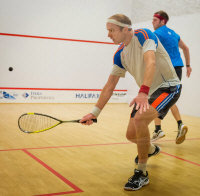 The
second game saw a similar trading of points up until the halfway
mark, when it was Cuskelly’s turn to pull ahead. He seemed to be
hitting much harder and much tighter drives – I can tell you
from experience these rarely go together for amateur players!
Desperately trying to close up the 6-8 deficit and get back to
the track he was on in the first, Coppinger used his effective
hold and made attacking boasts to throw off the Australian.
Cuskelly remained composed and looked to be closing out the game
at 9-7. A harsh no let decision at 9-8 stirred the beast within
Coppinger, who then channeled it into the next two rallies by
hammering cross court kills to bring the game to a tiebreak. At
this point I wouldn’t have been surprised if Coppinger broke the
sound barrier with how hard he was hitting. It wasn’t enough to
take the 2nd though, as Cuskelly converted a quick winner and a
deceptive boast after saving one game ball to take it 13-11 and
level the match off at one game apiece. The
second game saw a similar trading of points up until the halfway
mark, when it was Cuskelly’s turn to pull ahead. He seemed to be
hitting much harder and much tighter drives – I can tell you
from experience these rarely go together for amateur players!
Desperately trying to close up the 6-8 deficit and get back to
the track he was on in the first, Coppinger used his effective
hold and made attacking boasts to throw off the Australian.
Cuskelly remained composed and looked to be closing out the game
at 9-7. A harsh no let decision at 9-8 stirred the beast within
Coppinger, who then channeled it into the next two rallies by
hammering cross court kills to bring the game to a tiebreak. At
this point I wouldn’t have been surprised if Coppinger broke the
sound barrier with how hard he was hitting. It wasn’t enough to
take the 2nd though, as Cuskelly converted a quick winner and a
deceptive boast after saving one game ball to take it 13-11 and
level the match off at one game apiece.
To the unfamiliar it might seem like Coppinger jumped in a lake
with how much he was sweating on this humid Halifax evening –
but this is a familiar sight for squashies. The third game saw
Cuskelly off to a great start at 4-0, continuing the quality
from the previous game, but Coppinger’s blistering pace brought
him right back into the match and before you knew it we had a
tense 8-8 situation. Devastating errors decided the next string
of points, the majority of which came off the left handed
Australian’s racquet giving Coppinger the crucial third game
11-9.
From the start of the fourth you could tell there was no
stopping the Coppinger train to clench the match in four. He is
so deadly in the front of the court when given a high ball with
his deceptive holds and low hard drives. It didn’t take too much
longer for the South African to close out the match 11-5 in the
fourth.
By Jeff Scribner
[4] Miguel Rodriguez (COL) bt Alan Clyne (SCO) 13-11,11-8,
12-10 (52m)
As this match began, it appeared there was much less separating
these two players than the 24 ranking points in the difference
would suggest. The two players are of similar stature and both
demonstrated their quickness early on. Neither player was able
to mount a sizable lead, and the game was tied up at 3-3, 7-7,
and 10-10. Throughout the game, there were some massive rallies,
with both players demonstrating patience. Rodriguez mixed in
some variety with his signature flair, including a reverse angle
shot (locally known as the "Pat Kelly" or the “Kevin Byrne”),
catching Clyne off balance. He also displayed a seldom-seem high
reverse angle shot to the back, but Clyne was able to catch up
to it and win the rally. The game ended in dramatic fashion, as
Clyne had his opponent on the run, with the Columbian making
impressive pick-ups in diagonal corners, before putting a loose
ball into the left side nick to Clyne's dismay, for a 13-11
victory.
 In
the second game, the score remained close, with 2-2, 4-4, 5-5,
7-7, and 8-8 scores. Clyne was using a deceptive hold to try to
catch Rodriguez off balance, and Rodriguez was showing off his
"extra gear" of explosive speed to get to balls that seemed
unreachable. On at least one occasion, this took Clyne by
surprise, as he appeared to think the rally was soon to be over
when Rodriguez sped up like Wile Coyote and fetched a ball from
the back, with Clyne responding with a drop to the tin.
Rodriguez finished the game 11-8 with a winning cross-court
drop. In
the second game, the score remained close, with 2-2, 4-4, 5-5,
7-7, and 8-8 scores. Clyne was using a deceptive hold to try to
catch Rodriguez off balance, and Rodriguez was showing off his
"extra gear" of explosive speed to get to balls that seemed
unreachable. On at least one occasion, this took Clyne by
surprise, as he appeared to think the rally was soon to be over
when Rodriguez sped up like Wile Coyote and fetched a ball from
the back, with Clyne responding with a drop to the tin.
Rodriguez finished the game 11-8 with a winning cross-court
drop.
Early in the third game, Rodriguez showcased his leaping
ability, suggesting his vertical jump is about half of his
height. In doing so, he jumped out to a 5-2 lead, with both
players displaying impressive tight drop shots and equally
impressive quickness and soft hands to get the ball back despite
seemingly being glued to the sidewall. Rodriguez added some
variety by utilizing a flick of his wrist to deceive Clyne on a
number of drop shots in the middle of the game and some rewarded
him with points. Clyne was more apt to make a straight drop,
which he did repeatedly with precision, and occasionally
Rodriguez failed to pull them off the wall successfully. The
game got knotted up at 10-10, before Rodriguez pushed Clyne to
the back, and in a full-out effort, Clyne attempted a "Go Go
Gadget Arms" maneuver, but lost the grip of his racquet, sending
it flying to the front of the court. Rodriguez sealed his place
in the quarterfinals of the tournament with a perfect drop into
the front right nick. Baffled, Clyne appealed to the marker if
the ball was good, and when he indicated it was, Clyne replied,
"Are you sure? You can't see much from up there". It was to no
avail, as the marker was sure about the call, and Clyne was
surely disappointed with the result.
By Farley MacLeod
[3] Daryl Selby (ENG) bt [Q] Chris Gordon (USA) 11-6, 11-7,
11-9 (40m)
The sixth match of the night saw third seed and world number
nine Daryl Selby take on top American and Bluenose qualifier
Chris Gordon. With Selby 50 ranks above Gordon it didn’t seem to
be a likely victory for the qualifier, but being the first time
these competitors matched each other on the PSA tour, anything
could happen. The match started with long rallies as the players
tested the waters, but we soon saw that dissipate into short,
fast-paced exchanges that took the players all around the court.
It was difficult to discern any structure from how the rallies
played out, but Selby always remained at least two points ahead
of his younger opponent. Selby closed out the opener by a
comfortable 11-6 margin.
 The
second game was an almost repeat of the first as Selby
consistently stayed one step ahead of Gordon. During a long
rally midway through the game, Gordon pulled out the same shot
he’s nominated for in the October Shot of The Month for PSA TV:
a deceptive flick crosscourt drop from the back right corner.
The crowd responded and really backed Gordon to take it to the
Englishman. He was working quite hard as you could tell from the
beet red color of his face. By contrast, Selby looks like he
hasn’t even broken sweat! This writer suspects it may have
something to do with Selby’s main sponsor being a renewable
energy heating company. In any case, he motored on to close out
the second 11-7. The
second game was an almost repeat of the first as Selby
consistently stayed one step ahead of Gordon. During a long
rally midway through the game, Gordon pulled out the same shot
he’s nominated for in the October Shot of The Month for PSA TV:
a deceptive flick crosscourt drop from the back right corner.
The crowd responded and really backed Gordon to take it to the
Englishman. He was working quite hard as you could tell from the
beet red color of his face. By contrast, Selby looks like he
hasn’t even broken sweat! This writer suspects it may have
something to do with Selby’s main sponsor being a renewable
energy heating company. In any case, he motored on to close out
the second 11-7.
With the prospect of his Bluenose campaign coming to an end, the
American dug deep and fought even harder in the third. With
legendary squash coach Neil Harvey in his corner between games,
you can bet he gathered invaluable insight and encouragement to
help propel him. A common exchange that unfolded in the third
game saw Gordon going for a crosscourt nick off the serve,
followed by Selby playing a ridiculous topspin crosscourt drop,
then a Gordon counter drop, then Selby would slam the ball
crosscourt and Gordon then retrieved to reset the rally. As
always, Selby maintained his lead thoughout, and looked to be
finishing off the match at 10-7, but Gordon played a series of
unbelievable rallies to save two match balls. It was ultimately
a perfect length shot from Selby that finished off the match
3-0.
By Jeff Scribner
[8] Alister Walker (BOT) bt Andrew Schnell (CAN) 12-10, 11-6,
11-7 (34m)
The second match on hallowed court 3 at the Homburg Centre
featured Alister Walker, ranked 25 in the world from Botswana,
versus the Canadian Wild Card for the tournament Andrew Schnell
(ranked 101 in the world). The crowd was somewhat subdued to
begin the evening as fans trickled in to enjoy this match in the
round of 16. The first match was a tight affair, requiring a
tiebreak before Walker left the court 12-10. It was clear that
Walker was just a bit faster, and his shots just a margin
tighter than Schnell in the opening game, but it was also clear
that the lone remaining Canadian in the draw had a realistic
chance of doing some damage in the match.
 The
second game was back and forth to 6-6, before Walker began to
show his superiority, reeling off the next five points to take
the game 11-6. Much like the first game, the difference seemed
to be Walker’s ability to drop the ball a millimeter above the
tin at will from virtually any location on the court. Schnell
showed signs of brilliance, catching Walker heading the wrong
direction on more than a few occasions. The
second game was back and forth to 6-6, before Walker began to
show his superiority, reeling off the next five points to take
the game 11-6. Much like the first game, the difference seemed
to be Walker’s ability to drop the ball a millimeter above the
tin at will from virtually any location on the court. Schnell
showed signs of brilliance, catching Walker heading the wrong
direction on more than a few occasions.
Game 3 saw Walker race ahead to a 5-2 lead and hometown hopes
began to fade that Schnell might be able to eke out an upset
victory. Indeed, a string of points punctuated by gorgeous
fading crosscourt drop shots and effortless movement saw Walker
accumulate a 9-3 lead before much longer. Schnell mounted some
energy for a final push, getting as far as 6-10 before
ultimately falling 7-11 in the third and final game of the
match. Walker seemed pleased to see his way through to the
quarterfinals of the Bluenose Squash Classic in three games,
looking to make it deep into the tournament draw.
By David Westwood
[5] Cameron Pilley (AUS) bt [Q] Diego Elias (PER) 11-9, 11-4,
11-5 (42m)
Diego game out with a quick start at the beginning of the match,
and built a 6-2 lead. Pilley seemed unfazed and started to
tighten up his shots, which saw him hit several winning shots in
the front left corner and closed the lead to 5-6. During the
middle portion of the game they traded points, going back and
forth, until Pilley evened it up at 9-9. It was there that
Pilley picked up the pace and hit a winning shot into the mid
sidewall nick and then at 10-9, put the game-winning nick into
the front left corner taking the first game 11-9.
 The
second went back and forth at first as they were tied at 3-3 to
start the game. Again, Pilley started to put the pressure back
on Diego as he was starting to look fatigued from his match the
night before against Salazar that went to 5 games. The
second went back and forth at first as they were tied at 3-3 to
start the game. Again, Pilley started to put the pressure back
on Diego as he was starting to look fatigued from his match the
night before against Salazar that went to 5 games.
It was 7-4 Pilley when Diego started to try and slow down the
pace of the ball but it didn't have any effect on Pilley, as he
continued to hit the ball consistently into the back corners
until he finally hit the last three shots into the front right
hand corner nick to win the game 11-4.
Again, they game out to a 3-3 tie to start the third game.
However, it was Pilley who managed to take the lead, as he was
picking up the pace and putting more pressure on Diego, and
Pilley gathered a 4-point lead to go to 7-3. Diego tried to keep
up the pace and put the pressure back on Pilley, but the tall
Australian was too strong and hitting nick after nick to go up
10-5. Then Pilley forced Diego to hit a loose shot back at
himself, which resulted in a penalty stroke and the game to
Pilley 11-5.
By Brian Reid
[2] Peter Barker (ENG) bt [Q] Sebastiaan Weenink (NED) 11-4,
11-6, 11-8 (42m)
From the outset it was clear the lefthander from England had
come to play. The decibel meter spiked with each shot, and
despite the best efforts of Weenink to control the pace of play,
he fell quickly 11-4 in the first game. Barker’s power was
matched by his ability to hit pinpoint drop shots, and Weenink
was made to do tremendous work on every rally.
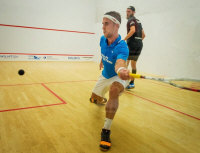 The
storyline was repeated in the second game, although it was clear
Weenink had adjusted his tactics, attempting to cut off more of
Barker’s cross-courts and to hit with more purpose. Losing 11-6,
things were beginning to look desperate for the Dutchman who had
appeared so strong coming through the qualification rounds. The
storyline was repeated in the second game, although it was clear
Weenink had adjusted his tactics, attempting to cut off more of
Barker’s cross-courts and to hit with more purpose. Losing 11-6,
things were beginning to look desperate for the Dutchman who had
appeared so strong coming through the qualification rounds.
The third game was a more even affair, with Weenink beginning to
find the right blend of power and control to keep pace with
Barker in the early going. Indeed, Barker was caught going the
wrong way more than a few times, although he showed a remarkable
ability to recover and gain the advantage on his returns. Points
were traded to 8-8 before Barker locked up the match 11-8 on the
strength of some punishing rallies that ended with precise
attacking boasts and a few timely nicks.
By David Westwood
|
|
QUALIFYING FINALS |
27-Oct, Qualifying Finals:
more photos
 Halifax
squash fans were treated to a full night of high quality squash
on the second day of qualifying for the 2014 Fiera Properties
Bluenose Squash Classic. There were no short matches tonight, as
the competitors were all closely matched. Ryan Cuskelly, the
top-ranked qualifier, took his predicted place in the main round
with a win over former Bluenose champion Shawn Delierre.
However, Cuskelly was the only one of the highest five ranked
qualifiers to make it through to the main draw. Sebastiaan
Weenink scored his second upset victory in as many nights. Halifax
squash fans were treated to a full night of high quality squash
on the second day of qualifying for the 2014 Fiera Properties
Bluenose Squash Classic. There were no short matches tonight, as
the competitors were all closely matched. Ryan Cuskelly, the
top-ranked qualifier, took his predicted place in the main round
with a win over former Bluenose champion Shawn Delierre.
However, Cuskelly was the only one of the highest five ranked
qualifiers to make it through to the main draw. Sebastiaan
Weenink scored his second upset victory in as many nights.
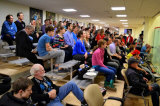 It
is quite likely that we had a glimpse of part of the future of
PSA squash, as the 17-year-old World Junior Champion Diego Elias
of Peru showed maturity beyond his years in a comeback victory
over the higher ranked Cesar Salazaar of Mexico. Elias
demonstrated a range of skills that is downright scary for
someone his age. It
is quite likely that we had a glimpse of part of the future of
PSA squash, as the 17-year-old World Junior Champion Diego Elias
of Peru showed maturity beyond his years in a comeback victory
over the higher ranked Cesar Salazaar of Mexico. Elias
demonstrated a range of skills that is downright scary for
someone his age.
In the end, our four qualifiers who move on to the main draw on
Wednesday represent four continents, highlighting the high level
international draw that Bluenose fans will get to enjoy over the
next four days.
Ryan Cuskelly (AUS) bt Shawn Delierre (CAN) 11-8, 11-5, 11-6
(50 mins)
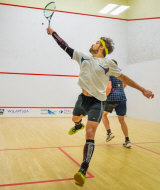 The
first match of the night started with Delierre hitting the ball
well, earning him a 4-1 lead. Both Delierre and Cuskelly picked
up the pace and traded the next several points to make it 7-3
for Delierre. Due to two quick stroke calls, Cuskelly managed to
close the gap to 5-7; however at 6-8, the momentum shifted when
Delierre broke his strings, and following a racquet switch,
Cuskelly finished the game with 6 straight points to win the
first 11-8. The
first match of the night started with Delierre hitting the ball
well, earning him a 4-1 lead. Both Delierre and Cuskelly picked
up the pace and traded the next several points to make it 7-3
for Delierre. Due to two quick stroke calls, Cuskelly managed to
close the gap to 5-7; however at 6-8, the momentum shifted when
Delierre broke his strings, and following a racquet switch,
Cuskelly finished the game with 6 straight points to win the
first 11-8.
 In
the second game, Cuskelly continued where he left off, driving
the ball to the back corners, and hitting winning drop shots
when the opportunities arose, jumping to a 9-2 start. Delierre
made a valiant attempt to bring the score to 10-5; however
Cuskelly's shot selection was too good, leading to an 11-5
victory. In
the second game, Cuskelly continued where he left off, driving
the ball to the back corners, and hitting winning drop shots
when the opportunities arose, jumping to a 9-2 start. Delierre
made a valiant attempt to bring the score to 10-5; however
Cuskelly's shot selection was too good, leading to an 11-5
victory.
The third game saw both players come out strong, making quality
shots to lead to a 4-4 tie. Cuskelly began to increase the
pressure on Delierre, leading to several unforced errors, and a
subsequent 9-4 lead. Delierre was able to win 2 more points, but
Cuskelly was on his game, making minimal mistakes and hitting
great lengths to take the game 11-6, and the match 3-0.
By Brian Reid
Sebastiaan Weenink (NED) bt Asyraf Azan (MAS)
11-6,11-9,7-11,11-6 (58m)
The crowd was electric tonight, having just enjoyed a thoroughly
entertaining 60-minute match between Shawn Delierre and Ryan
Cuskelly. Not to mention it was free pizza, and free squash, for
all in attendance! Spotted in the crowd tonight, Ms. Orshy Torok
chatting about Miguel Angel Rodriguez and his clothing
preferences, Ms. Sara Lafrance enquiring as to the mood amongst
the players and sharing stories about Chris Gordon’s food
preferences and quantities, the Gifted Typist herself, Ms. Gail
Lethbridge waxing poetic about the virtues of muscle memory, and
of course Mr. Tim Roberts looking positively ravishing in a
mauve collared shirt. But enough about the crowd, let’s get to
the action.
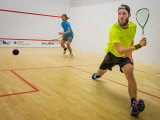 Two
lanky players with very contrasting styles, Weenink very
deliberate in the pre-match knock-up, hitting all four corners,
while Azan seemed more keen to impress the crowd with his
racquet skills, hitting between-the leg shots and topspin drops.
This theme pervaded much of the competition, with Weenink
playing a strong, consistent game with some occasional flair,
whereas Azan went for more glory with his crosscourt nick
attempts, deceptive holds, and attacking drives. Two
lanky players with very contrasting styles, Weenink very
deliberate in the pre-match knock-up, hitting all four corners,
while Azan seemed more keen to impress the crowd with his
racquet skills, hitting between-the leg shots and topspin drops.
This theme pervaded much of the competition, with Weenink
playing a strong, consistent game with some occasional flair,
whereas Azan went for more glory with his crosscourt nick
attempts, deceptive holds, and attacking drives.
In the first game Azan opened with two quick points on
crosscourt nicks, giving a taste of what was to come. Weenink
gained the points back on two Azan tins, before reeling off six
straight points through a mixture of steady, tight drives, the
occasional working boast, and wonderful volley work. Azan was
flicking his wrist and trying to catch Weenink off guard but the
man from the Netherlands was having none of it. Every flashy
shot was followed up by a routine straight drive or volley drop,
and Azan appeared to be getting frustrated with the lack of
success.
 “Is
that even allowed?” wondered someone behind me, as Azan faked
six shots before putting away a hard low crosscourt for a
winner. Azan began to look for interference on the tighter
shots, but the referees were having none of it. Several no lets
were given, and Azan was given a conduct warning for excessive
contact when down 6-10. Appropriately, it seemed, Weenink took
the first game 11-6 on a decisive No Let call by the upstairs
officials. Voices in the crowd wondered aloud if the pattern of
play would decay to the level seen last year in Azan’s
qualification match, an affair marred by excessive interference
and conduct issues. “Is
that even allowed?” wondered someone behind me, as Azan faked
six shots before putting away a hard low crosscourt for a
winner. Azan began to look for interference on the tighter
shots, but the referees were having none of it. Several no lets
were given, and Azan was given a conduct warning for excessive
contact when down 6-10. Appropriately, it seemed, Weenink took
the first game 11-6 on a decisive No Let call by the upstairs
officials. Voices in the crowd wondered aloud if the pattern of
play would decay to the level seen last year in Azan’s
qualification match, an affair marred by excessive interference
and conduct issues.
The second game began with a faster pace, Azan seemed to
recognize he needed to change tactics after the opening game
loss. Several lets punctuated the first point, and the crowd
heaved a collective sigh. “Here we go again” said someone near
the back of the grandstands. A stroke to Weenink followed by two
No Lets gave the Dutchman the early 3-0 lead. Unlike his
opponent, Weenink made every effort to play each ball despite
occasional interference from Azan, earning congratulatory
applause from the appreciative fans in attendance. Furious
hitting by Azan earned him a point, but Weenink took the next
two with steady length shots and another No Let, pulling ahead
6-1.
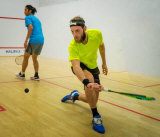 Some
ridiculous short work by both players had the audience on the
edge of their collective seat, with some polite golf clapping
for a delightful nick by Azan. The Malaysian stormed back to 6-6
on the strength of aggressive play and some impeccable
precision. The players pushed forward to 8-8 as they traded
decisive crosscourts and tight drops. A quick stroke to Weenink
followed by an incredible hold and flick, and Azan was suddenly
down game ball at 8-10. One game ball was saved with a drop shot
that found a comfortable resting place in the nick, but a
disappointing tin spelled the end of Azan in the second game
11-9. Some
ridiculous short work by both players had the audience on the
edge of their collective seat, with some polite golf clapping
for a delightful nick by Azan. The Malaysian stormed back to 6-6
on the strength of aggressive play and some impeccable
precision. The players pushed forward to 8-8 as they traded
decisive crosscourts and tight drops. A quick stroke to Weenink
followed by an incredible hold and flick, and Azan was suddenly
down game ball at 8-10. One game ball was saved with a drop shot
that found a comfortable resting place in the nick, but a
disappointing tin spelled the end of Azan in the second game
11-9.
Here we go for the third game, the crowd firmly rooting for
Weenink largely because of his workmanlike attitude, but also
his enormous lumberjack style beard, which resonated with the
Canuck locals. Azan came to play in this game, however, pulling
ahead 2-0 with some tight drives followed by devastating drop
shots. Weenink began to work the lob to the forehand back
corner, catching Azan several times en route to a 2-2 scoreline.
Azan raced forward to 7-3 as he began to find some form and
began to play through some minor interference.
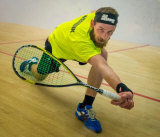 Weenink’s
level was clearly slipping a bit, perhaps correlated with the
increased redness of his face due to the extreme effort. Picking
up his energy level a bit, Weenink won back two points on a
deceptive trickle boast and a stroke on his approach to the
front left which was prevented by the presence of Azan’s body.
9-5 now for Azan despite being tackled to the floor by the
enthusiastic Weenink, who was only too keen to re-enact Azan’s
theatrics to the delight of the viewing audience. At 10-6, Azan
earned his first gameball as Weenink levitated his lob out of
court, saving the next point on an extremely fast cutoff volley.
Not willing to concede this game, Azan closed it out 11-7 after
winning a prolonged counterdrop battle. According to local
sports authority Tim Roberts, this was a spicy win for the
Malaysian. Weenink’s
level was clearly slipping a bit, perhaps correlated with the
increased redness of his face due to the extreme effort. Picking
up his energy level a bit, Weenink won back two points on a
deceptive trickle boast and a stroke on his approach to the
front left which was prevented by the presence of Azan’s body.
9-5 now for Azan despite being tackled to the floor by the
enthusiastic Weenink, who was only too keen to re-enact Azan’s
theatrics to the delight of the viewing audience. At 10-6, Azan
earned his first gameball as Weenink levitated his lob out of
court, saving the next point on an extremely fast cutoff volley.
Not willing to concede this game, Azan closed it out 11-7 after
winning a prolonged counterdrop battle. According to local
sports authority Tim Roberts, this was a spicy win for the
Malaysian.
After some yeoman’s service by none other than local squash
celebrity Mr. Carl Helmick mopping up the court floors, the
crowd settled in for one more piece of free pizza and some
entertaining squash. Azan seemed keen to build on his success in
the preceding game, exerting his immense skill and constructing
a 3-0 lead. A few minutes later we were level at 4-4 as Azan
found the tin and Weenink began to regain some precision and
footwork.
“He should do that all the time” remarked one young squash fan
as Azan casually deposited another serve to the forehand nick.
Azan fell to 5-6 down on a no-let followed immediately by a
conduct stroke for abuse of equipment, extracting some degree of
satisfaction by striking the offending floor with his racquet.
The wheels started to come off Azan’s wagon as he continued to
self-destruct, with Weenink enjoying a 9-6 lead on the strength
of little more than steady play. The crowd erupted at Weenink’s
lucky nick on that fading drive that took him to match ball at
10-6. Azan pirouettes to the front trying to avoid Weenink, but
only receives a no let for his efforts as Weenink claims the
final game 11-6 and the match 3 games to 1. The crowd seemed
suitably pleased with this result.
By David Westwood
Diego Elias (PER) bt Cesar Salazar (MEX) 8-11, 3-11,
11-5, 11-7, 11-9 (80m)
 Despite
less than two years of experience on the PSA World Tour and
being lower in rank, those in the ‘squash-know’ would have
favoured the rising star Diego Elias, having won the past two
encounters against Cesar Salazar earlier this year. Those wins
were far from one sided though (3-2 & 3-1), and from the first
rally the squash crowd knew they were about to witness the
unfolding of a battle between walls. Despite
less than two years of experience on the PSA World Tour and
being lower in rank, those in the ‘squash-know’ would have
favoured the rising star Diego Elias, having won the past two
encounters against Cesar Salazar earlier this year. Those wins
were far from one sided though (3-2 & 3-1), and from the first
rally the squash crowd knew they were about to witness the
unfolding of a battle between walls.
Salazar started solid, picking up all of Elias’ millimetre tight
drops and took a 7-3 lead. Elias retaliated with slugger drive
variations from the frontcourt directed straight at Salazar,
which took ‘Matrix’ dodges to stay alive in the rally more than
once. Elias didn't manage to get closer than within two points
though, with the first game going to Salazar 11-8 after some
outlandish rallies.
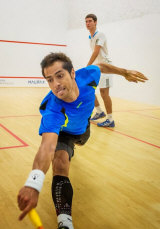 The
second game saw Salazar run away quickly to a strong lead by
exploiting loose cross courts and front court shots from Diego
that Salazar read and pounced on early. With a dip in
concentration resulting in two errors, Elias chose to tank the
2nd at 8-3, leading to an 11-3 and 2-0 for the Mexican. The
second game saw Salazar run away quickly to a strong lead by
exploiting loose cross courts and front court shots from Diego
that Salazar read and pounced on early. With a dip in
concentration resulting in two errors, Elias chose to tank the
2nd at 8-3, leading to an 11-3 and 2-0 for the Mexican.
 The
third and fourth saw both players demonstrating their expertise
in varying the pace as the shots ranged from beautiful soft
straight lobs and feather drops to bludgeoning drives and low
kills on each side. It was Salazar’s turn to tank a game in the
third as Elias rode a wave of energy to take it 11-5. The fourth
also saw several strings of points from the Peruvian Puma to
push the well-contested match into a nail biting fifth game. The
third and fourth saw both players demonstrating their expertise
in varying the pace as the shots ranged from beautiful soft
straight lobs and feather drops to bludgeoning drives and low
kills on each side. It was Salazar’s turn to tank a game in the
third as Elias rode a wave of energy to take it 11-5. The fourth
also saw several strings of points from the Peruvian Puma to
push the well-contested match into a nail biting fifth game.
After solid tight play from Elias to take the lead at 5-4,
several close call appeals in Elias’s favour saw the animated
Salazar vent his frustration to the squash gods above (the
referees upstairs). Not a dull moment as the match became tied
up at 7-7. “Absolutely nothing between them!” Tense rallies saw
them level again at 9-9, but two decisive errors from the
Salazar racquet gave the closest match of the night to Diego
Elias.
By Jeff Scribner
Chris Gordon (USA) bt Shahir Razik (CAN) 11-9, 6-11, 11-9,
11-6 (62m)
 In
the last match of qualifying which lasted 62 minutes, we saw a
clash of North America. American and world #59 Chris Gordon
played Canadian PSA veteran and world #108, Shahier Razik. This
was their third time competing against each other. Gordon
appeared determine to be on the winning side after losing last
week in Montreal to Razik in 5. In
the last match of qualifying which lasted 62 minutes, we saw a
clash of North America. American and world #59 Chris Gordon
played Canadian PSA veteran and world #108, Shahier Razik. This
was their third time competing against each other. Gordon
appeared determine to be on the winning side after losing last
week in Montreal to Razik in 5.
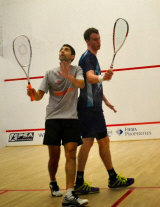 Gordon
came out on top winning the first game 11-9. Gordon started the
second game strong taking a 4-0 lead but Razik fought back to
tie it 5-5. There were some good rallies back and fourth but
Razik's patience helped him win the game 11-6. The third game
was another close one, with Gordon taking it 11-9. In the
fourth, Gordon went up to a quick 7-2 lead after Shahier threw
his racket in frustration and received a conduct stroke. Gordon
came out on top winning the first game 11-9. Gordon started the
second game strong taking a 4-0 lead but Razik fought back to
tie it 5-5. There were some good rallies back and fourth but
Razik's patience helped him win the game 11-6. The third game
was another close one, with Gordon taking it 11-9. In the
fourth, Gordon went up to a quick 7-2 lead after Shahier threw
his racket in frustration and received a conduct stroke.
A last push by Razik to shorten the gap got him to 6-8. A let
call for contact between the two lead to Gordon being rammed to
the floor in Razik's attempt to keep the rally going. Gordon
kept his focus on the main draw and took the game 11-6.
By Martin Dumas
more photos
Photos by Jim Neale and Farley MacLeod
|
|
QUALIFYING ROUND ONE |
27-Oct, Qualifying Round
One:
more photos
 The
first round of qualifying of the 2014 Fiera Properties Bluenose
Squash Classic saw an enthusiastic crowd on hand to watch squash
players from near and far. Some matches saw local hopeful
challenge PSA tour professionals. The
first round of qualifying of the 2014 Fiera Properties Bluenose
Squash Classic saw an enthusiastic crowd on hand to watch squash
players from near and far. Some matches saw local hopeful
challenge PSA tour professionals.
Other matches had professional players representing five
continents dueling for an opportunity to move toward the main
draw, which begins on Wednesday. Our four maritime hopefuls gave
it their best efforts, but none were able to knock off the pros.
Former Bluenose champions, and Canadians, Shawn Delierre
and Shahier Razik both successfully moved on to the
second round of qualifying, while Sebastiaan Weeniink of
the Netherlands pulled off a significant upset to move on as
well.
Our team of reporters tell the stories ...
Shawn Delierre
(CAN) bt Mike Buchanan (CAN) 11-8, 11-8, 11-3 (25m)
The first match saw PSA #60 Shawn Delierre play Prince Edward
Island’s top player Mike Buchanan. This was Mike's second
straight year being invited as a local qualifier. Mike was
hoping to build on his experience last year and his goal this
year was "to stay in the rally".
Accompanied by his mother, wife and 8-month-old daughter, Mike
was excited to play Canada's top squash player. There was some
great rallies between the two during the 25-minute match. Mike
did his best to keep it close during the first two games, losing
11-8 both times, but Shawn took control in the third with some
fancy front court boasting to take the third 11-3.
By Martin Dumas
Muhd Asyraf Azan (MAS) bt Matt Bishop (CAN) 11-5, 11-6, 11-8
(24m)
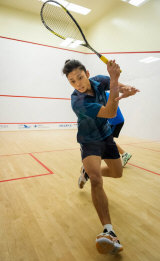 Fresh
from a big tournament win over the weekend, hometown favourite
Matt Bishop was up for the challenge playing the enigmatic Muhd
Asyraf Azan on storied court 3 at the Homburg Centre. Fresh
from a big tournament win over the weekend, hometown favourite
Matt Bishop was up for the challenge playing the enigmatic Muhd
Asyraf Azan on storied court 3 at the Homburg Centre.
The long-time Nova Scotia #1 presented the best chance of an
upset victory in the first round of qualification, and the local
crowd was up for the challenge, quickly getting behind their
champion. Bishop was in tough, falling quickly into a 0-4 hole
as Azan controlled the play in the early going, much to the
chagrin of the 20 or so Bishop family members in the front row.
Shaking his head and looking down at his watch with a grimace,
Bishop turned the heat up a few degrees and started pounding the
ball with more confidence and authority, hitting a furious nick
to earn a delighted roar from the crowd.
Azan fought back with his patented backhand cross-court nick,
racking up two quick winners to jump ahead 6-1. Back and forth
for a few rallies, Bishop pushed Azan with some penetrating
lengths and pinpoint drops. Azan’s unorthodox racquet technique
proved too much for Bishop’s defence as the world #63 surged to
an 11-5 victory in the first game.
 After
some exquisite glass cleaning by the local crew of Kristian
Lethbridge-Hall and Zach Petropolis, the play resumed with much
encouragement from the crowd. Visibly buoyed by the support,
Bishop came out firing, objecting to what he perceived was a
missed ‘out’ call by the referees by slamming the ball past Azan
to jump ahead 1-0. Azan fought back with some unretrievable
nicks of his own, pulling ahead quickly 2-1. Down 5-1, Bishop
passed up the opportunity to earn a stroke, opting instead to
play the ball but ending up on the short end of the rally. After
some exquisite glass cleaning by the local crew of Kristian
Lethbridge-Hall and Zach Petropolis, the play resumed with much
encouragement from the crowd. Visibly buoyed by the support,
Bishop came out firing, objecting to what he perceived was a
missed ‘out’ call by the referees by slamming the ball past Azan
to jump ahead 1-0. Azan fought back with some unretrievable
nicks of his own, pulling ahead quickly 2-1. Down 5-1, Bishop
passed up the opportunity to earn a stroke, opting instead to
play the ball but ending up on the short end of the rally.
 Not
to be kept down, Bishop turned to his short game to win a few
points with some millimetre precision shots that Azan could not
excavate. Pulling close at 5-7, Bishop caught Azan wrong-footed
and the Malaysian fell to the floor leaving a sweaty profile
that quickly evaporated. Down 8-5 Bishop was called for a
conduct warning after tapping the floor with his racquet a bit
aggressively after failing to reach a drop shot in time. The
crowd seemed puzzled by the harsh penalty for the relatively
minor infraction and a buzz began to grow. Pulling ahead to
10-6, Azan quieted the crowd by putting the second game away
with yet another backhand cross-court nick. Not
to be kept down, Bishop turned to his short game to win a few
points with some millimetre precision shots that Azan could not
excavate. Pulling close at 5-7, Bishop caught Azan wrong-footed
and the Malaysian fell to the floor leaving a sweaty profile
that quickly evaporated. Down 8-5 Bishop was called for a
conduct warning after tapping the floor with his racquet a bit
aggressively after failing to reach a drop shot in time. The
crowd seemed puzzled by the harsh penalty for the relatively
minor infraction and a buzz began to grow. Pulling ahead to
10-6, Azan quieted the crowd by putting the second game away
with yet another backhand cross-court nick.
The third game saw the closest competition of the match, with
Bishop and Azan trading points with some stunning holds, drops,
and boasts, until Azan got his nose in front by two points at
8-6. The crowd was going wild with Bishop’s frantic efforts and
attacking squash, and he fed off the energy by pulling to 8-9.
After tinning a volley drop, Bishop stood at the precipice down
match ball at 8-10. An Azan drop to the front left was just out
of Bishop’s reach as the ‘not up’ call put an end to his dream
of a second-round qualification match. The appreciate crowd gave
Bishop a well-deserved roar as he exited the court,
acknowledging his valiant effort against the deceptive and
lethal Azan.
By David Westwood
Sebastiaan Weenink (NED) bt Alfredo Avila (MEX) 11-4, 11-5,
11-4 (39m)
 One
of the first round match-ups in the qualification phase, Weenink
got the first few points early using his astounding retrieval
skills in all four corners, bringing him to a 5-0 start. Avila
replied with two drops in rapid succession, but Weenink remained
consistent in applying pressure, forcing Avila to make a number
of errors, with a final score of 11-4. One
of the first round match-ups in the qualification phase, Weenink
got the first few points early using his astounding retrieval
skills in all four corners, bringing him to a 5-0 start. Avila
replied with two drops in rapid succession, but Weenink remained
consistent in applying pressure, forcing Avila to make a number
of errors, with a final score of 11-4.
In the second game, Weenink maintained this intensity, playing
aggressively, and making several winning drop shots for a quick
3-1 score. They traded points back and forth to make it a 7-3
game, before Weenink turned up the pace, resulting in an 11-5
result.
Weenink's hot streak continued in the third game, rapidly
reaching a score of 6-2. The next rally was a long one,
resulting in a let call, to Avila's dismay. He attempted to use
this to his advantage, becoming more aggressive in the next few
points, with a service return nick into the front left corner,
followed by another kill shot into the back left corner.
Ultimately however, Weenink remained unphased and triumphed with
an 11-4 victory to take the match 3-0.
By Brian Reid
Cesar Salazar (MEX) bt Mike McCue (CAN) 11-7, 8-11, 11-5,
11-8 (46m)
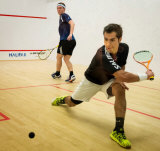 You
wouldn't have guessed that 87 world ranking positions separate
the two players with how the match played out, but that just
goes to show how competitive the world tour is at the moment.
McCue started strong in every game, but it was the more
experienced Salazar that kept calm and rallied on to gradually
take apart his younger opponent. You
wouldn't have guessed that 87 world ranking positions separate
the two players with how the match played out, but that just
goes to show how competitive the world tour is at the moment.
McCue started strong in every game, but it was the more
experienced Salazar that kept calm and rallied on to gradually
take apart his younger opponent.
Well-timed drops from the front of the court were McCue's
strongest point converting shots. Unphased, Salazar fought
through and in the late stages of the match finally started to
play his trademark hold drops and flicks that put McCue
scrambling to stay in the match. That didn't stop the Canadian's
fighting spirit, and at the business end of the fourth game
really looked like he would push to a fifth. It wasn't to be
though, as Salazar outmanoeuvred his opponent and closed out the
match at 46min. in the fourth.
By Jeff Scribner
Diego Elias (PER) bt Josh Rudolph (CAN) 11-2, 11-4, 11-4
(21m)
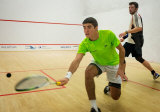 Diego
Elias, the reigning World Junior Squash Champion, has had some
significant upset victories on the PSA tour in recent months.
Josh Rudolph, a native of Liscombe, Nova Scotia, now makes his
home in Halifax. He represented Nova Scotia at the 1999 Canada
Games. Diego
Elias, the reigning World Junior Squash Champion, has had some
significant upset victories on the PSA tour in recent months.
Josh Rudolph, a native of Liscombe, Nova Scotia, now makes his
home in Halifax. He represented Nova Scotia at the 1999 Canada
Games.
In the first game, Elias’ play would best be described as steady
and patient. Rudolph was often under pressure and forced into
making errors. The first game was 11-2 for Elias. The second
game began with the players trading points, and a 2-2 score,
before Elias reeled off seven straight points to a 9-2 lead.
Elias seemed to keep the pressure on Rudolph through the second,
before taking it 11-4.
In the third game, Elias was more aggressive, hitting three nick
winners in the front right corner, and appearing comfortable
throughout, as he took the third game 11-4.
By Farley MacLeod
Chris Gordon (USA) bt [Q] Graham Kerford (CAN) 11-4, 11-6,
11-5 (20m)
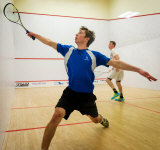 One
of the last matches of the night showcased another local player.
The match was fast and furious, with Kerford jumping to a 2-0
lead in the first game. Gordon was able to close the gap to a
4-4 tie, and as he rapidly adjusted to the court, and scored 7
quick points to take the first game 11-4. One
of the last matches of the night showcased another local player.
The match was fast and furious, with Kerford jumping to a 2-0
lead in the first game. Gordon was able to close the gap to a
4-4 tie, and as he rapidly adjusted to the court, and scored 7
quick points to take the first game 11-4.
The pace continued with another solid start for Kerford, leading
to a 3-3 score midway through the second game. The rallies were
short and intense, as Gordon tightened up his game to pull away
10-4. Kerford fought back with 2 fast points, but Gordon closed
it out with a front right drop for an 11-6 score.
Gordon maintained his momentum in the third game, going up 8-3.
They traded points for the next few rallies but Gordon
capitalized on his opportunities, preventing any comeback for
Kerford, with Gordon winning the last game 11-5.
By Brian Reid
Shahier Razik (CAN) bt Martin Knight (NZL) 11-7, 11-5, 11-8
(54m)
 Energy
had been building all evening for what looked on paper to be one
of the most intriguing first-round qualification matches. Local
fan favourite and honorary Haligonian Martin Knight had been
spotted earlier in the day noshing on some delicious
carbohydrate glazed snacks at a local Tim Hortons, so he surely
had the energy for the ever-patient Shahier Razik. Energy
had been building all evening for what looked on paper to be one
of the most intriguing first-round qualification matches. Local
fan favourite and honorary Haligonian Martin Knight had been
spotted earlier in the day noshing on some delicious
carbohydrate glazed snacks at a local Tim Hortons, so he surely
had the energy for the ever-patient Shahier Razik.
Coming off some injury trouble in recent tournaments, Razik was
rumoured to be regaining his passion for the sport and posed a
serious challenge for the higher-ranked Knight. The match began
with a series of steady rallies, highlighting the precision and
control of these talented athletes. Heads began shaking in the
crowd as each successive drive came closer and closer to the
sidewalls. Razik was gaining the advantage steadily, catching
Knight moving the wrong way a few times, and floating some
perfect lobs to the back corners. To the surprise of many, Razik
surged out to an early 4-0 lead in the first as Knight struggled
to gain control of the match.
 The
Canadian continued to control the play with some deceptive
boasts that just cleared the top of the tin, catching Knight a
few centimetres short. Razik captured a decisive 8-4 lead on an
80+ shot rally that had the crowd mesmerized and running out of
superlatives. The play was remarkably clean, with no more than a
few decisions asked of the referees, as both competitors were
quick to clear their shots and allow their opponent access to
the ball. Razik continued to move Knight to the front left
corner with impeccable drop shots that put the New Zealander
under tremendous pressure, often following up by floating
cross-court lobs that caught Knight out of a position for easy
winners. 11-7, and the crowd began to buzz as the underdog Razik
captured the first game in a mere 22 minutes. The
Canadian continued to control the play with some deceptive
boasts that just cleared the top of the tin, catching Knight a
few centimetres short. Razik captured a decisive 8-4 lead on an
80+ shot rally that had the crowd mesmerized and running out of
superlatives. The play was remarkably clean, with no more than a
few decisions asked of the referees, as both competitors were
quick to clear their shots and allow their opponent access to
the ball. Razik continued to move Knight to the front left
corner with impeccable drop shots that put the New Zealander
under tremendous pressure, often following up by floating
cross-court lobs that caught Knight out of a position for easy
winners. 11-7, and the crowd began to buzz as the underdog Razik
captured the first game in a mere 22 minutes.
After the break, Knight brought in a new game plan and tried to
stamp his seal on the match with more aggressive play, but the
result was the same as Razik countered with deliberate,
controlled drives and precise drops earning point after point
until he held a 6-1 lead. Knight was simply unable to
outmaneuver Razik on this occasion, as the Canadian continued to
hit the corners and exert pressure on Knight even as the Kiwi
crept to 5-8. The crowd continued to approve of the quality of
shots by both players, delighting in the effortless movement of
Razik and the explosive acceleration of Knight. Working the
drop-lob sequence to perfection, Razik wrapped up the second
game 11-5 and it seemed clear an upset was in the making.
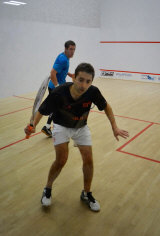 The
third game saw Knight forge his first lead of the match, pulling
ahead 4-1 as Razik’s precision and control lapsed ever so
slightly. Perhaps a comeback was on the way? Razik steadily
worked his way back into the game with his traditional, patient
approach, finding once more the form that served him so well in
the first two games. At 7-7 it appeared that both players were
gaining energy and enthusiasm, and the crowd was firmly behind
Knight as they looked to extend this first evening of
qualification matches. The
third game saw Knight forge his first lead of the match, pulling
ahead 4-1 as Razik’s precision and control lapsed ever so
slightly. Perhaps a comeback was on the way? Razik steadily
worked his way back into the game with his traditional, patient
approach, finding once more the form that served him so well in
the first two games. At 7-7 it appeared that both players were
gaining energy and enthusiasm, and the crowd was firmly behind
Knight as they looked to extend this first evening of
qualification matches.
At 8-all Razik pushed into Knight moving to the front left,
earning a stroke despite Knight’s protests about the physical
contact. Tinning the next shot, Knight surrendered the lead he
had held all game, falling to 8-9 then 8-10 on a no-let that had
the crowd debating the definition of a ‘retrievable’ ball.
Completing the upset, Razik squeezed a ‘not up’ from Knight to
take the third game 11-8 and the match 3 games to love.
By David Westwood
more photos
Photos by Jim Neale and Farley
MacLeod
|
Bluenose attracts world-class
squash players to Halifax
The Fiera Properties Bluenose Squash Classic has attracted one of
the best line-ups of professional squash players in the tournament’s
nine-year history.
Three world top-ten and two top-20 players will headline a
contingent of 28 players from around the world. They will compete
for a prize of $50K at the Homburg Centre for Health and Wellness at
Saint Mary’s University, Oct. 27-Nov. 1.
“This line-up will produce some of the best squash ever seen here
in Halifax,” said tournament chair and founder Zal Davar.
“We have upped the prize this year to $50,000 from $35,000 last
year. This has generated a lot of interest on the Professional
Squash Association tour. I am ecstatic about this draw.”
 Headlining
this year’s tournament will be Bluenose champion Miguel Angel
Rodriguez of Columbia who will be defending his 2013 title. He is
currently ranked world 13th. Headlining
this year’s tournament will be Bluenose champion Miguel Angel
Rodriguez of Columbia who will be defending his 2013 title. He is
currently ranked world 13th.
Also competing will be top-seeded and world No. six ranked Borja
Golan from Spain, Peter Barker, eighth, and Daryl Selby, tenth, both
from England. All are veterans of the Bluenose tournament.
This year’s line-up also includes world top-30 players, including
Cameron Pilley, Australia, 22nd, Stephen Coppinger, South Africa,
23rd, Adrian Waller, England, 27th and Alister Walker, Botswana,
30th.
Rounding out the 12 main draw entries are Tom Richards, England,
33rd, Mohamed Mohamed Abouelghar, Egypt, 38th.
Canadian Andrew Schnell is the wildcard entry. He is ranked 98th.
Sixteen qualifiers will compete to join the Main Round entries; four
of them will complete the field. Bluenose Classic gets boost
 Fiera
Properties Bluenose Squash Classic is pleased to announce that
it is upgrading to a $50K International event on the PSA circuit. Fiera
Properties Bluenose Squash Classic is pleased to announce that
it is upgrading to a $50K International event on the PSA circuit.
This will make the Bluenose one of the biggest professional squash
events in Canada.
The tournament, scheduled for Saint Mary’s University in Halifax,
October 27 - November 1, will attract top professional squash
athletes from all over the world.
“This is hugely exciting for the squash community and Halifax,”
said Zal Davar, founder of the Bluenose. “There are few
other sports that can attract the world’s top professionals to
compete in Halifax each year.”
The jump from a $35K to a $50K purse is due to increased sponsorship
from Halifax-based offshore services company Welaptega Marine and
through on-going support from title sponsor Fiera Properties, also
of Halifax, in addition to the core group of loyal sponsors.
Davar said the increased purse gets the attention of squash athletes
planning their tournament schedules for the 2014-15 season.
This year the Bluenose will also launch a local charity modelled on
the hugely successful Street Squash program which targets
“under-represented” youth to participate in the sport of squash.
The Bluenose Tournament, now in its 9th year, is a favourite of PSA
athletes because of its reputation for friendliness from the local
squash community of enthusiasts, sponsors and volunteers.
|
|
 |
|